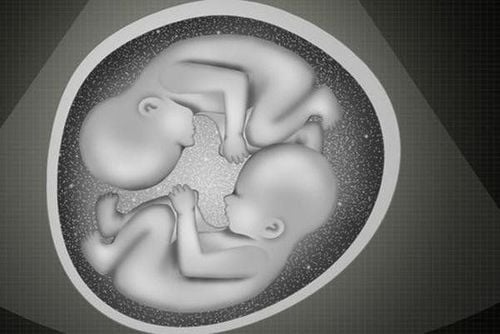This is an automatically translated article.
The article was professionally consulted with Specialist Doctor I Bui Thi Ha - Pediatrician - Neonatologist - Department of Pediatrics - Neonatology - Vinmec Ha Long International General Hospital.Amniotic fluid infection is an infection of the amniotic membrane and the amniotic fluid that surrounds the fetus and is the main cause of premature rupture of membranes before 37 weeks of pregnancy and premature delivery. Newborns with amniotic fluid infections are at very high risk of dying from neonatal infections.
1. What role does amniotic fluid play?
Amniotic fluid is a thin, pale yellow liquid that surrounds the fetus, which is one of the important factors for the safe development of the fetus in the womb during pregnancy. Amniotic fluid will help the fetus move freely in the womb, it allows the baby to develop comprehensively according to human body standards.Amniotic fluid is a medium rich in nutrients, has the ability to regenerate and exchange, plays a very important role in the development of the fetus. Amniotic fluid nourishes the embryo by reabsorption of amniotic fluid, which is done mainly through the baby's digestive system. The fetus begins to drink amniotic fluid from the 20th week of pregnancy.
In addition, amniotic fluid is also reabsorbed through the umbilical cord, amniotic membrane and through the baby's skin. From the 24th week of pregnancy onwards, the fetus absorbs from 300ml-500ml of amniotic fluid every day. This amount of amniotic fluid will enter the bloodstream and contribute to the balance of fluids in the body of the fetus, part will be filtered to form urine for the baby, part will be taken into the intestines to create meconium.
In addition, amniotic fluid also has the function of protecting and protecting the fetus from collisions, or trauma and especially ensuring a sterile environment for the baby in the amniotic sac. Mechanically, amniotic fluid creates an environment for the fetus to develop normally and harmoniously in the mother's genital tract during the last months of pregnancy. During labor, amniotic fluid will continue to protect the fetus from the trauma of uterine contractions and infection. Amniotic fluid helps to form the amniotic sac and dilates the mother's cervix, making it easier to clear the cervix.
After the rupture of membranes, the oily nature of the amniotic fluid has the role of lubricating the mother's genital tract, making it easier for the fetus to be born.

2. Amniotic fluid infection
Amniotic fluid is a transparent and sterile environment, but when bacteria such as Ecoli, group B streptococcus that cause vaginitis, enter the amniotic cavity mainly through the vagina, causing bacterial infection of the amniotic membrane and amniotic fluid. surrounding amniotic fluid. This bacterial infection is called amniotic fluid infection.After 12 days of conception, amniotic fluid begins to form. During pregnancy, when the mother's amniotic fluid is observed to be cloudy green and contains pus, or has a foul smell, it is very likely that the mother has an amniotic infection in the uterus.
There are many causes of amniotic fluid infection during pregnancy. Amniotic fluid infection can originate before or during the mother's pregnancy.
If this phenomenon exists before pregnancy, it is most likely because the mother has unprotected sex, leading to gynecological infections, creating a favorable environment for E Coli bacteria and especially bacteria. Group B strep bacteria enter the body.
So when you are pregnant, these bacteria are even more able to stick to the inside and last longer. If not treated definitively and properly, bacteria can invade and cause amnionitis, causing the amniotic membrane to rupture at any time of pregnancy.
Trắc nghiệm: Mẹ bầu nên làm gì khi bị thiếu ối?
Nước ối đóng vai trò quan trọng trong sự tồn tại và phát triển của thai nhi. Trường hợp lượng ối quá ít (thiểu ối) thì sẽ tiềm ẩn những nguy cơ như gây thiểu sản phổi, chèn ép dây rốn,... Trả lời các câu hỏi trắc nghiệm sau sẽ giúp bạn có những cách phòng ngừa và điều trị kịp thời.The following content is prepared under supervision of Thạc sĩ, Bác sĩ y khoa, Tạ Quốc Bản , Sản phụ khoa , Khoa Sản phụ khoa - Bệnh viện Đa khoa Quốc tế Vinmec Phú Quốc
Babies born in premature rupture of membranes, infection will be life-threatening. Amniotic fluid infection also adversely affects the health of the mother. Most of the time, doctors will diagnose amniotic fluid infection based on the mother's symptoms such as: Fever, increased heart rate of both mother and baby. In more severe cases of amniotic fluid infection, it will cause the mother to have symptoms such as: uterine pain, foul-smelling amniotic fluid, blue amniotic fluid color.
In case the mother has an amniotic infection during pregnancy, the doctor will prescribe a treatment method for the mother such as: placing medicine, using a cleaning solution... In addition, when amniotic fluid infection is suspected. Your doctor may prescribe antibiotics. However, it is necessary to base on the antibiotic map and infection situation at health facilities to get the appropriate recommendations and resistance models. Mothers need to follow all the doctor's orders to quickly recover from the disease.
Absolutely do not quit halfway or arbitrarily buy medicine to take without a doctor's prescription. In severe cases and with urgent signs, the doctor will assign the mother to give birth immediately.
To make sure that there is no longer a possibility of infection after birth, the doctor will give both mother and baby antibiotics after birth. Depending on the mother's condition, the doctor will prescribe the appropriate medicine.
3. Causes of neonatal infection of amniotic fluid

Moreover, if the pregnant mother has a urinary tract infection, the baby is also likely to have an infection when she is born. These harmful bacteria can enter the baby's body through objects such as needles, gastric catheters, unclean hands...
Or when the mother has a urinary tract infection giving birth Having sex or having cervical cleft, many times of vaginal examination are also causes of infection in children.
In case the mother's illness is related to spirochetes, listeria, or candidiasis during pregnancy, these bacteria can be transmitted through the placenta or mother's bloodstream to the fetus during pregnancy. pregnancy. They can also infect the baby, when the baby is delivered vaginally.
4. Newborns with amniotic fluid infection are dangerous?
Amniotic fluid infection is one of the most dangerous infections, not only affecting the fetus but also seriously affecting the mother's health, and also the mother's ability to become pregnant in the future.Newborns born with an infection of the amniotic fluid have a very high risk of dying from neonatal infection. This leads to respiratory failure, meningitis, and sepsis. When the fetus is born, if the amniotic fluid is infected, it will definitely affect the health and development of the baby compared to normal babies.
When a newborn has an infection of the amniotic fluid, it is common to experience some of the following problems:
Lethargic sleep, difficult to wake up Less movement than usual Poor sucking or stopping sucking Purulent discharge from the ear, many pimples skin pus, redness around navel or umbilical discharge Swelling of joints or reduced mobility of extremities, severe chest cramps, convulsions, fever or hypothermia Vomiting, regurgitation of milk and food, groaning, breathing fast or irregular breathing..
5. Newborn with amniotic fluid infection what to do?
Depending on the individual case of an infection, the doctor can take appropriate measures to support the baby.. Usually, the doctor will give the infant antibiotics when the baby has an infection. amniotic fluid. In addition to using antibiotics, the doctor will give the baby other supportive measures such as:Oxygen: This case is used until the baby has cyanosis, blue veins, rapid breathing, irregular breathing, You will be given oxygen to ensure the baby's breathing is balanced. When seeing that the baby has a fever, the mother should use a fever-reducing patch to reduce the infant's temperature. Besides, it will be necessary to actively monitor blood sugar, if the baby's blood sugar is low, it should be followed under the guidance of a specialist. In the process of taking care of the baby, the mother must pay attention to clean the baby, especially the umbilical cord area, to avoid infection for the baby. It is best for mothers to breastfeed their babies exclusively for the first 6 months, to ensure the comprehensive development of the baby. Breast milk contains lgA antibodies, so it strengthens the immune system to help prevent infections and other dangerous diseases.
6. How to prevent babies from getting amniotic fluid infection.

To ensure the safety of both mother and baby, and to prevent amniotic infection, mothers should try to keep the intimate area clean during pregnancy, by cleaning regularly. If you see symptoms such as itching, discharge with a strange smell, or milky white color... then go to the hospital immediately for examination and treatment before the infection spreads from the vagina to the uterus, and then finally is the amniotic sac. In addition, mothers need to have regular antenatal check-ups so that doctors can monitor and take measures for timely treatment.
Vinmec International General Hospital offers a Package Maternity Care Program for pregnant women right from the first months of pregnancy with a full range of antenatal care visits, periodical 3D and 4D ultrasounds and routine tests to ensure that the mother is healthy and the fetus is developing comprehensively.
Pregnant women will be consulted and checked for health under the close supervision of experienced and specialized Obstetricians, helping mothers have more knowledge to protect their health during pregnancy as well as reduce reduce complications for mother and child.
Please dial HOTLINE for more information or register for an appointment HERE. Download MyVinmec app to make appointments faster and to manage your bookings easily.















